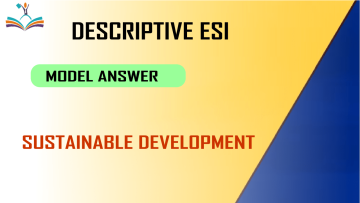
Descriptive ESI – RBI Grade B 2023
Question : – What do you understand by sustainable development? Where does India stand in such development?
Model Answer
Introduction
Sustainable development refers to the concept of meeting present needs without compromising the ability of future generations to meet their own needs. It involves balancing economic growth, environmental protection, and social well-being. This essay aims to define sustainable development and assess India’s position in achieving sustainable development goals.
Body:
Definition and Principles of Sustainable Development :
Sustainable development encompasses three main pillars: economic, environmental, and social. It entails promoting economic growth that is inclusive, environmentally responsible, and socially equitable. It emphasizes the efficient use of resources, the protection and conservation of the environment, social inclusivity, poverty eradication, and the preservation of cultural heritage. The principles of sustainable development call for integration across sectors, long-term planning, participation and engagement of stakeholders, and consideration of intergenerational equity.
India’s Commitment to Sustainable Development
India has demonstrated a commitment to sustainable development through various initiatives. The country has set ambitious targets aligned with the United Nations’ Sustainable Development Goals (SDGs). It has launched programs such as the National Action Plan on Climate Change, Swachh Bharat Abhiyan (Clean India Mission), and Skill India Mission. India’s commitment to renewable energy, with ambitious targets for solar and wind power, showcases its focus on clean and sustainable energy sources.
Progress and Challenges in India’s Sustainable Development
India has made notable progress in several areas of sustainable development. The country has witnessed a decline in poverty rates, improvements in healthcare, and increased access to education. Additionally, the expansion of renewable energy, afforestation efforts, and initiatives to promote sustainable agriculture have shown positive outcomes. However, challenges remain in areas such as air and water pollution, waste management, urbanization, and income inequality. Balancing economic growth with environmental conservation and addressing social disparities are ongoing challenges.
Policies and Initiatives for Sustainable Development
India has implemented several policies and initiatives to advance sustainable development. The government has focused on promoting renewable energy, enhancing energy efficiency, and reducing carbon emissions. Initiatives like the Smart Cities Mission, AMRUT (Atal Mission for Rejuvenation and Urban Transformation), and rural development programs aim to create sustainable urban and rural environments. Efforts to promote sustainable agriculture, water conservation, and biodiversity conservation are also underway. The introduction of e-mobility, waste management regulations, and conservation of natural resources demonstrate the country’s commitment to sustainable development.
Conclusion
Sustainable development encompasses a multidimensional approach that balances economic, environmental, and social aspects. India has shown its commitment to sustainable development through various policies and initiatives. While progress has been made, ongoing challenges highlight the need for continued efforts to achieve sustainable development goals and ensure a sustainable future for India and its citizens.


